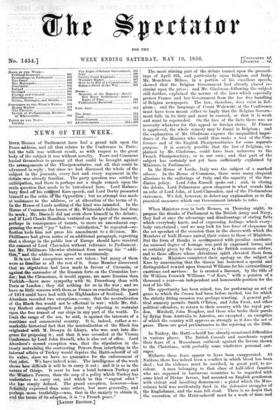NEWS OF THE WEEK.
Born; Houses of Parliament have had a grand talk upon the Peace address, and all that relates to the Conference in Paris ; but the talk was without result, as with respect to the great body of the subject it was without novelty. Peers and Commons busied themselves to present all that could be brought against the arrangements of the Plenipotentiaries and all that could be advanced in reply ; but since we had discussed the whole of the subject in the journals, every fact and every argument in the debate was already familiar. The party question was settled by anticipation, and there is perhaps not a single remark upon the main question that needs to be introduced here. Lord Mahnes- bury fired off his reWed Kars speech, and Lord Derby presented himself as the critic off the Opposition ; but no attempt was made at resistance to the address or at alteration of the terms of it. In the House of Lords nothing of the kind was intended. In the Rouse of Commons the lesson of Mr. Whiteside's failure had done its work ; Mr. Disraeli did not erns show himself in the debate ; and if Lord Claude Hamilton ventured on the spur of the moment, perhaps in consequence of taunts, to move an amendment sup- pressing the word joy " before " satisfaction," he repented—re- fleetion bade him not press his amendment to a division. Mr. Pbillimore had given notice of an additional paragraph, regretting that a change in the public law of Europe should have received the consent of Lord. Clarendrin without reference to Parliament but Mr. Phillimore likewise abstained from moving his " addi- tion," and the address was agreed to unanimously.
It is not that exceptions were not taken ; but many of them were as familiar as all the rest of it. Some Member discovered that no stipulation had been made in favour of Circassia, or against the surrender of the Russian forts on the Circassian bor- ate : but the Cireassians, it would appear, are more Russian than Turkish—have more sympathy with- St. Petersburg than with Paris or London ; they did nothing for us in the war ; and we have as little concern with them as France on concluding the peace of 1814 could have had with the Highlanders of Scotland. Lord Aberdeen recorded two exceptions,—one, that the neutralization of the Black Sea would not be effectual in war ; while Mr. Sid- ney Herbert strengthened this point by objecting to restraint upon the free transit of our ships in any part of the world. To Inuit the range of the sea, he said, is against the interests of a maritime and commercial country. It is, indeed, rather a re- markable historical fact that the neutralization of the Black Sea originated with M. Drottyn de .1.huys, who was sent into dis- grace for proposing it ; and that it was seconded at the Vienna Conference by Lord John Russell, who is also out of office. Lord Aberdeen's second exception was, that the stipulation in the treaty restraining the contracting Powers from interfering in the internal affairs of Turkey would deprive the. 'Hatti-scheriff of all its value, since we have no guarantee for the enforcement of that edict. We have indeed none. The intelligence of the week shows how_ difficuli it.will be to carry it out ; and it is so in the nature of things. It must be less a bond between Turkey and
the Western Powers, than the map of a policy which Turkey has undertaken to' carry oat, and' which in this " august edict " she has simply defined. The grand exception, however—less definitely expressed than some others, but more generally, and perhaps more truthfully—was, that in the anxiety to obtain it, and the terms of its adoption, it is " a French peace." The most stirring part of the debate turned upon the proceed- ings of April 8th, and particularly upon Belgium and Italy. Mr. Monckton Milnes, in a portion of his excellent speech, showed that the Belgian Government had already placed re- straint upon the press ; and Mr. Gladstone following the subject still further, explained the nature of the laws which especially protect France and her Government from the too free handling of Belgian newspapers. The law, therefore, does exist in Bel- gium ; and the language of Count Walcwski at the Conference must have been meant either to imply that the Belgian Govern.. ment fails in its duty and must be coerced, or that it is weak and must be superseded. On the face of the facts there was no necessity whatever for this appeal to foreign states. If France is aggrieved, the whole remedy may be found in Belgium ; and the explanation of Mr. Gladstone exposes the unqualified impu- dence of the Minister who could thus make a tool of the Con- ference and of the English Plenipotentiaries for some separate purpose. It is scarcely possible that the law of Belgium, ek- plained by Mr. Gladstone, could have been unknown to the French Plenipotentiary, or to our own ; and that part of the subject has certainly not yet been sufficiently explained by Ministers in Parliament.
In the House of Lords, Italy was the subject of a marked silence. In the House of Commons, there were many eloquent allusions to the sufferings of Italy and the sagacity of the Sar- dinian policy. Lord John Russell spoke out ; and, in closing the debate, Lord Palmerston grew eloquent in what sounds like- an echo of Lord. John, of Lord Clarendon, and of the Piedmontese statesmen. We fail, however, to detect any explanation as to the practical measures which our Government intends to take.


























